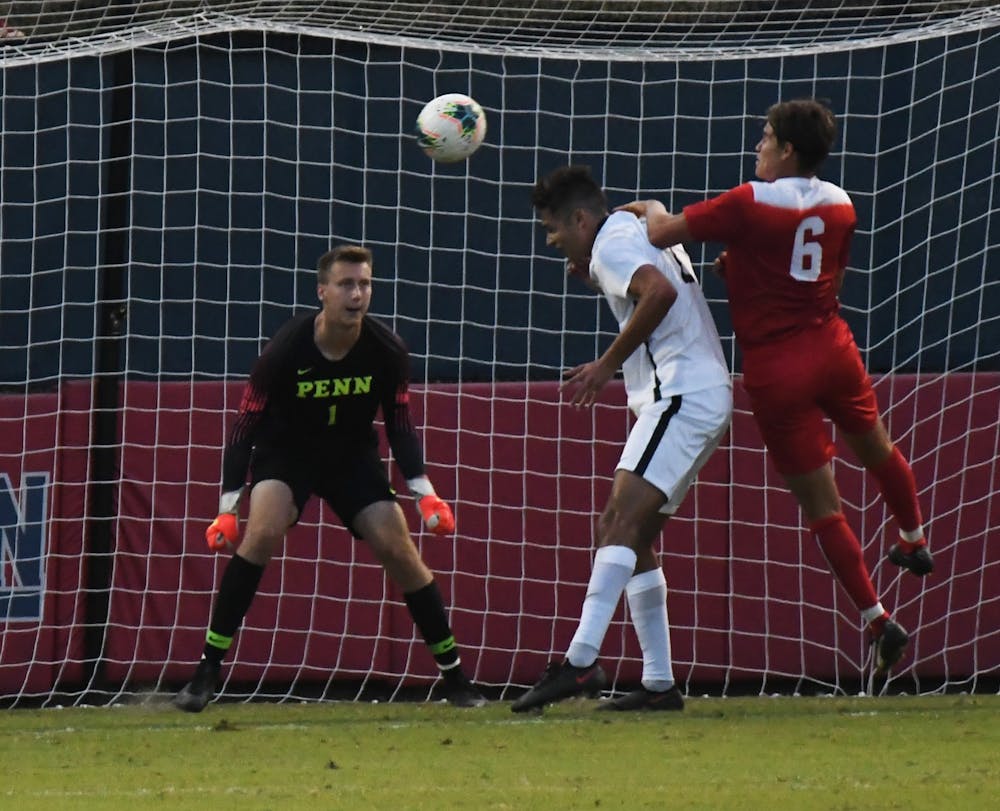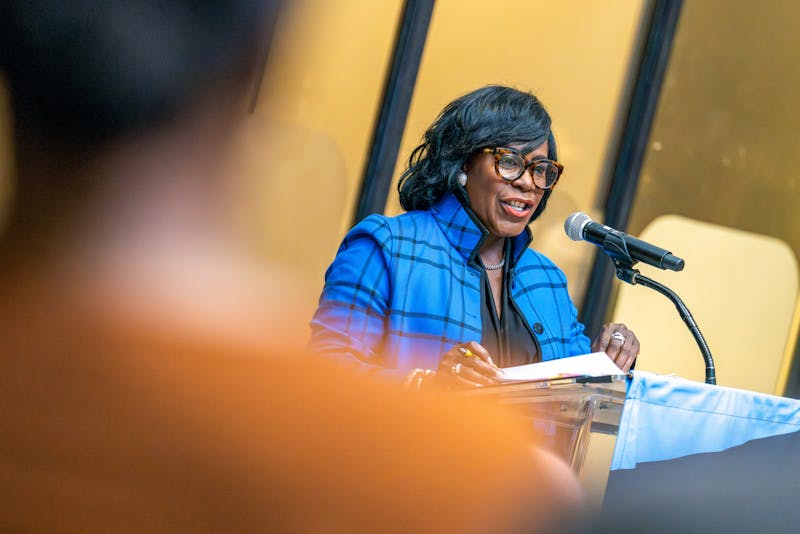
Freshman defender Leo Burney heads the ball away from the goal during the Cornell game on Oct. 2.
Credit: Jenna BoccherFour players on Penn men’s soccer currently rank near the top of the Ivy League for individual statistics in shots, goals, assists, and points. Yet on the same page of the Ivy League website, only a few categories credit defense — with saves and shutouts presenting the only measured distinctions for defensive players.
But for Penn, a rookie playing from the backline has been leading the team in minutes played — freshman center back Leo Burney. Burney has totaled 840 minutes on the field as a starting player for all nine of the Red and Blue's matches so far.
The Class of 2024 recruit took a gap year to preserve his first season with the Quakers. He is now joining the team as a reliable and perhaps indispensable part of the Penn squad.
“Honestly, it feels great like coming in as a freshman and just having the trust of the coaching staff to give me minutes,” Burney said, “We're having a good season so far, so it feels good to contribute to the team and hopefully we can keep it going.”
The rookie’s name hasn’t been the one shouted most often from the stands at Rhodes Field, nor is he the star-striking presence to evoke the most attention of the match.
“Leo is a quiet, competitive player. He is a leader in his own way, and I'll be interested to see how that develops over the course of his time here,” coach Brian Gill said.
But supporters still recognize him for his solid, dependable guard from the backline — or even perhaps for his protective face mask earlier in the season. Burney’s contributions to Penn’s defense go beyond just having played the most minutes so far.
“The combination of being a competitive, winning-type mentality with a reliable, everyday-performing type is really what we're starting to learn about him, just how he can really impact our team in a number of different ways,” Gill said. “He’s a confident personality as well, which is always really important for the position he plays on the field.”
Players on defense tend to see more minutes than positions farther up the field. Across the five major European leagues, the top spots in most minutes played are routinely dominated by goalkeepers and defensive players.
And with generous substitution rules in college soccer, coaches have more flexibility in pacing their players throughout the match. But with frequent substitution comes the opportunity cost of benching players who may already be better tuned to the rhythm of the game. As with any competitive sport, players are better suited to matchups when they understand their opponents, and only so much knowledge of the game can be fulfilled with prior film analysis compared to having cleats on the field.
As a result, a common attribute amongst players with the most game time — in both the professional leagues and collegiate — is their consistent performances and dependability, which Burney has been proving thus far.
“What is making him very valuable for us now — and I think it will be something where he continues to be valuable for our program here at Penn through the next four years of his career — is going to be his consistency,” Gill said.
But Burney isn’t a stranger to consistently delivering for his team, especially in his experience with the Sounders FC Academy. From serving as captain of his academy team since 2017, to winning the USSDA Playoffs in 2018, and being named Man of the Match in his first USLC appearance, Burney appeared as a proper fit to succeed Penn’s graduating center backs.
“When we were recruiting in Leo's class, we knew we wanted to be bringing in a center back who would have top-level quality because we were going to be replacing a couple upperclassmen — who at the time were Casey Barone and Alex Touche,” Gill said. “We were expecting leaders to come in and be somebody that could contribute.”
Every name currently on Penn men’s soccer has also previously appeared on the rosters of a youth club or academy, meaning each player was deemed among the best of their peers as young recruits. So each player courses their own period of adjusting to the Penn shirt after spending many seasons as the top talents of their home teams.
“I've had to adjust a little bit to playing in a different style. There are definitely some things at the start of the season, like in preseason, that I was doing that the coaches wanted me to change — with positioning defensively, especially," Burney said. "And I kind of had to learn how to play on the left side as a center back — I usually played on the right side at Sounders — so that was kind of a change. The coaches have been really helpful in getting my positioning better and just learning how to better protect the goal.”
Yet for Burney, his acclimation to the team has been notably quick.
“He had a lot of opportunities there to experience the game at a high level — both with the teams he was playing with, but also with the pro teams above the academy teams. And so I think to some extent he was prepared to make that transition,” Gill said. “Sometimes [players] are able to transition fully in their freshman year; sometimes it might take a year. But Leo seems to have been able to come in and make some pretty good strides early going.”
At heart, soccer is a balancing act between the 11 players on the field. Outstanding players on offense must be supported with a solid defense to prevent counterattacks from progressing too far up the field. And in between, good communication bridges every role to form a solid team.
When sitting defensively, Penn has been comfortable with three or four players at the back — relying on clear communication to either clear the ball away from the goal or guide it into their goalkeeper’s gloves.
Yet this communication has greatly improved from matches earlier in the season, when Penn conceded several goals only a few minutes after scoring. With a new season and new teammates, Burney was soon aware of what he needed to contribute to mend the gap.
“I think some of the improvement is coming from just watching film with the coaches after games and learning — both individually and as a group: how we can improve positionally, decision making, and also how we can be a more cohesive backline especially," Burney said. "And we're making better plays now than the start of the year because we're more used to each other. And the communication is a big thing; it's definitely gotten better between the defenders, so I think it's only going to get better from here too.”
A tough 1-0 win against an unyielding Monmouth proved a true test of the progress of Penn’s defense. After frequently giving up aerials from the start, Penn tested a change in approach by sitting conservatively — a crucial decision as Monmouth failed to finish any close chances.
While Burney wears number two on his jersey, he does not play the number’s respective role of a right-winger —as is frequently the case in college soccer.
“I'm most comfortable as a center back,” Burney said. “I’ve played center back for probably the last, like, eight or nine years of my life. I started out as a winger, and then moved to outside back, and now the past eight years, I've been a center back and that's where I'm most comfortable."
As a fan, Burney has been supporting the club of perhaps one of the best to ever wear the number two: Manchester United's Gary Neville. Burney reflects the historical winning qualities of his favorite team in his own game.
“I grew up watching Wayne Rooney,” Burney said, “But my favorite center back of all time is Nemanja Vidić. He's a rock in the back and, I think, a very under-appreciated center back.”
When asked how close he is to being the best version of himself as a player on the pitch, Burney expressed immense desires to improve both for himself and the team.
“I think I still have quite a ways to go. I think I'm doing things well right now and I'm in a good running form, but I can definitely improve my decision making,” Burney said. “I want to help the team get clean sheets more consistently, and I think that I can really just keep improving.”
The Daily Pennsylvanian is an independent, student-run newspaper. Please consider making a donation to support the coverage that shapes the University. Your generosity ensures a future of strong journalism at Penn.
Donate






